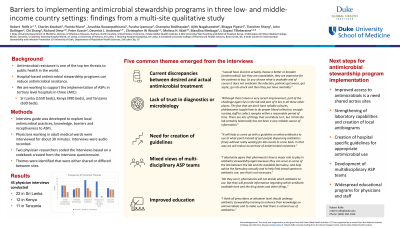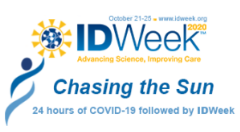Category: Antimicrobial Stewardship: Program Development and Implementation
Poster Session: Antimicrobial Stewardship: Program Development and Implementation
166 - Barriers to implementing antimicrobial stewardship programs in low- or middle-income country settings: findings from a multi-site qualitative study

- RR
Robert J. Rolfe
Infectious Diseases Fellow
Duke University
Durham, North CarolinaDisclosure: I do not have any relevant financial / non-financial relationships with any proprietary interests.
- CK
Charles M. Kwobah
Assistant Lecturer
Moi Teaching and Referral Hospital
Eldoret, Rift Valley, KenyaDisclosure: I do not have any relevant financial / non-financial relationships with any proprietary interests.
- FM
Florida Muro
Head of Community Health Department-KCMC Lecturer
Institute of Public Health (IPH)
Moshi, Kilimanjaro, TanzaniaDisclosure: I do not have any relevant financial / non-financial relationships with any proprietary interests.
- AR
Anushka S. Ruwanpathirana
Physician
Colombo North Teaching Hospital- Sri Lanka
Cincinnati, OhioDisclosure: I do not have any relevant financial / non-financial relationships with any proprietary interests.
- FL
Furaha Lyamuya
MD
Kilimanjaro Christian Medical Centre
Moshi, Kilimanjaro, TanzaniaDisclosure: I do not have any relevant financial / non-financial relationships with any proprietary interests.
- CB
Champica K. Bodinayake
Head of Department
University of Ruhuna
Galle, Southern Province, Sri LankaDisclosure: I do not have any relevant financial / non-financial relationships with any proprietary interests.
- AN
Ajith Nagahawatte
Professor of Microbiology
University of Ruhuna
Galle, Southern Province, Sri LankaDisclosure: I do not have any relevant financial / non-financial relationships with any proprietary interests.
- DP
Dammalage Lasanthi Bhagya Piyasiri
Head of Microbiology
Teaching Hospital Karapitiya
Galle, Southern Province, Sri LankaDisclosure: I do not have any relevant financial / non-financial relationships with any proprietary interests.
- TS
Tianchen Sheng
Ms.
Duke University Medical Center
Durham, NCDisclosure: I do not have any relevant financial / non-financial relationships with any proprietary interests.
- JB
John W. Bollinger
Student
Duke Global Health Institute
Durham, North CarolinaDisclosure: I do not have any relevant financial / non-financial relationships with any proprietary interests.
- CZ
Chi Zhang
Student
Duke Global Health Institute
Durham, North CarolinaDisclosure: I do not have any relevant financial / non-financial relationships with any proprietary interests.

Richard H. Drew
Professor of Medicine / Professor of Pharmacy
Duke School of Medicine/Campbell University College of Pharmacy & Health Sciences
Durham, North CarolinaDisclosure: I do not have any relevant financial / non-financial relationships with any proprietary interests.
- PK
Peter S. Kussin
Professor of Medicine
Duke University
Durham, North CarolinaDisclosure: I do not have any relevant financial / non-financial relationships with any proprietary interests.
- DA
Deverick J. Anderson
Professor
Duke Center for Antimicrobial Stewardship and Infection Prevention
Durham, North CarolinaDisclosure: I do not have any relevant financial / non-financial relationships with any proprietary interests.
- CW
Christopher W. Woods
Professor of Medicine
Duke University
Durham, North CarolinaDisclosure: I do not have any relevant financial / non-financial relationships with any proprietary interests.
- MW
Melissa H. Watt
Research Associate Professor
University of Utah School of Medicine
Salt Lake City, UtahDisclosure: I do not have any relevant financial / non-financial relationships with any proprietary interests.
- BM
Blandina T. Mmbaga
Director
Kilimanjaro Christian Medical Centre
Moshi, Kilimanjaro, TanzaniaDisclosure: I do not have any relevant financial / non-financial relationships with any proprietary interests.
- LT
L Gayani Tillekeratne
Assistant Professor
Duke University
Durham, North CarolinaDisclosure: I do not have any relevant financial / non-financial relationships with any proprietary interests.
Presenting Author(s)
Co-Author(s)
Background:
Antimicrobial resistance has been named as one of the top ten threats to health in the world. The World Health Organization has endorsed the implementation of hosptial-based antimicrobial stewardship programs (ASPs) to reduce antimicrobial resistance. We conducted a qualitative study to determine perceived barriers to the development and implementation of ASPs in low- and middle-income countries (LMICs).
Methods: We conducted 46 interviews with medical doctors at tertiary care hospitals in Sri Lanka (22 doctors), Kenya (12), and Tanzania (12). Interviews assessed knowledge and receptiveness to ASPs and barriers to implementing ASP protocols. Interviews were conducted in English, audio recorded, and transcribed. The interviews discussed knowledge of antimicrobial resistance and ASPs, current antimicrobial prescribing practices, access to diagnostics, receptiveness to ASPs, and perceived barriers to implementing ASPs. Data analysis followed procedures of applied thematic analysis, and used NVivo software. A codebook included structural themes based on the interview questions and emerging inductive themes. Two independent reviewers coded the interviews, and the coding was combined and reviewed for consensus. Themes were synthesized, with comparisons made across the three sites.
Results: Medical doctors from all three sites discussed multiple barriers to improving antimicrobial prescribing: prohibitively expensive antimicrobials, limited antimicrobial availability, resistance to change current practices regarding antimicrobial prescribing, and limited diagnostic data. The most frequent of these barriers discussed in all three locations was limited drug availability, mentioned by 12/22 physicians in Sri Lanka, 5/12 in Tanzania and 8/12 in Kenya. Improved education was a suggested component of ASPs in all three sites: 7/22 in Sri Lanka, 6/12 in Tanzania, and 6/12 in Kenya.
Conclusion: The study highlighted several important issues in determining the next steps for the implementation of ASPs in these LMIC hospitals. Improving drug availability and improving education to change physicians’ antimicrobial prescribing practices are important targets that could be addressed by ASPs in these facilities.

